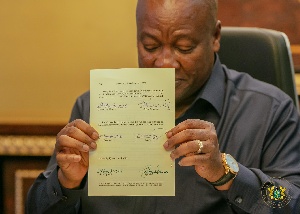Business News of Wednesday, 9 April 2025
Source: www.ghanawebbers.com
Betting Tax in Ghana: Has it been properly abolished or a legislative drafting error?
Ghana's Lottery Tax Repeal: A Closer Look
Ghana has abolished the tax on lottery winnings twice. The first instance was in 2017, and the second occurred in 2025. Both times, the process faced legislative challenges.
The recent repeal of the withholding tax, known as the "betting tax," excited many lottery players. However, a legal question remains: Does this repeal eliminate all taxes on lottery winnings or just the withholding obligation at payout?
In 2017, the betting tax was removed under Act 956. It was reintroduced in 2023 through Act 1094. In March 2025, Act 1129 repealed it again.
The key issue is whether this repeal fully abolishes the betting tax or if it's a drafting error in both Acts. Is income from betting taxed elsewhere despite its removal from investment income classification?
Legally, the signed repeal ends withholding taxes at payout for lottery winnings. However, it’s unclear if this extends to overall taxation of lottery income under the Income Tax Act.
Historical Context of Gambling in Ghana
Gambling has existed throughout history. In colonial Gold Coast, it included informal betting houses and underground lotteries.
After independence, Ghana faced unregulated gambling challenges as lotteries spread rapidly. These activities often harmed ordinary citizens and deprived the state of revenue.
To address these issues, Ghana introduced two laws: The Lotteries Betting Act (1960) and The National Weekly Lotto Act (1961). These laws aimed to regulate gambling activities effectively.
Act 31 criminalized unauthorized lotteries while establishing strict oversight over gaming activities. Recognizing potential revenue from well-managed lotteries led to creating a state monopoly with Act 94.
Over time, various regulations were enacted to manage lotteries better. This included reforms that established the National Lottery Authority (NLA) with regulatory powers.
Taxation of Lottery and Gambling Income
Under Ghana’s Income Tax Act (2015), taxable income falls into three categories: Employment income, Business income, and Investment income.
Employment income includes salaries and benefits from employment relationships. Business income covers profits from trades or professions.
Investment income refers to returns from assets like dividends and lottery winnings. Since 2015, Ghana has classified lottery winnings as investment income.
Countries vary in taxing gambling winnings based on their tax systems. Some treat them as occasional windfalls; others consider them business income for professional gamblers.
Initially, lottery winnings were taxed at a rate of 5%. In 2016, an amendment exempted up to GHS 2,592; excess amounts were taxed at that rate again.
In response to proposals by NLA for more mainstream operators' attraction, Parliament passed amendments in 2017 to scrap taxes on winnings entirely.
Reintroduction of Withholding Tax in 2023
The Budget Statement for 2023 announced stakeholder engagements regarding taxation on gambling began in 2021. A new tax structure would replace Corporate Income Tax and VAT with a token withholding tax on winnings.
This led to passing Act 1094 which reintroduced a withholding tax of 10% on lottery winnings.
Withholding tax is efficient for collecting taxes directly at source. It ensures compliance with tax laws while reducing administrative burdens for taxpayers and authorities alike.
In many jurisdictions including Ghana, this system operates as final withholding tax meaning no further filing obligations exist for recipients after deduction at source.
Repeal of Withholding Tax in 2025
The Budget Statement for 2025 announced plans to abolish the withholding tax on lottery winnings again through Act 1129. This act amended Section 6 of previous legislation excluding lottery winnings from investment calculations entirely.
However, questions arise about whether this repeal was properly executed due to potential drafting issues within both repeals since they did not explicitly categorize such incomes as exempt amounts under existing law provisions.
From a policy perspective: If an amount is taxable or exempt must be clearly defined by law amendments made during repeals.
If not classified under investment income nor exempted elsewhere then what is its nature?
It appears that while withholding obligations have been removed operators still may need clarification regarding their responsibilities concerning taxation under existing provisions.
Winnings could still fall into taxable categories either as business or isolated transactions depending upon frequency or organization level involved within those activities.
Thus even though withholding aspects are repealed it does not automatically mean all forms related earnings become non-taxable altogether.
Conclusion
Parliament must clarify distinctions between abolishing withholding taxes versus exempting underlying incomes completely from taxation purposes moving forward.
Unless specific exemptions are provided through legislation amendments winners remain liable declaring appropriate taxes owed per current laws otherwise risk facing penalties associated evasion charges accordingly.
Questions linger about professional gamblers’ status regarding taxation alongside other promotional winning scenarios needing further examination by lawmakers ensuring clarity across future regulations governing these matters effectively going forward.
By Francis Timore Boi Esq [[email protected]]
Tax Consultant & Member Chartered Institute of Taxation Ghana











